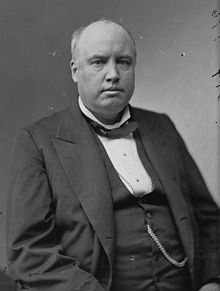Robert Green Ingersoll
| Robert G. Ingersoll | |
|---|---|
 |
|
| Born | Robert Green Ingersoll August 11, 1833 Dresden, New York, U.S. |
| Died | July 21, 1899 (aged 65) Dobbs Ferry, New York, U.S. |
| Resting place | Arlington National Cemetery |
| Occupation | Politician, orator, lecturer |
| Nationality | American |
| Period | 19th century |
| Genre | Satire, essay, social commentary, political commentary, philosophical literature, Biblical criticism |
| Subject | Freethought, Agnosticism, Humanism, Abolitionism, Women's rights, Literature |
| Spouse | Eva Parker Ingersoll |
| Children |
Eva Ingersoll Wakefield, Maud Ingersoll Probasco |
| Relatives | Ebon Clarke Ingersoll |
|
|
|
| Signature | |
Robert Green "Bob" Ingersoll (August 11, 1833 – July 21, 1899) was an American lawyer, a Civil War veteran, politician, and orator of the United States during the Golden Age of Free Thought, noted for his broad range of culture and his defense of agnosticism. He was nicknamed "The Great Agnostic".
Robert Ingersoll was born in Dresden, Yates County, New York. His father, John Ingersoll, was an abolitionist-sympathizing Congregationalist preacher, whose radical opinions caused him and his family to relocate frequently. For a time, Rev. John Ingersoll substituted as preacher for American revivalist Charles G. Finney while Finney was on a tour of Europe. Upon Finney's return, Rev. Ingersoll remained for a few months as co-pastor/associate pastor with Finney. The elder Ingersoll's later pastoral experiences influenced young Robert negatively, however, as The Elmira Telegram described during 1890: [1]
Though for many years the most noted of American infidels, Colonel Ingersoll was born and reared in a devoutly Christian household. His father, John Ingersoll, was a Congregationalist minister and a man of mark in his time, a deep thinker, a logical and eloquent speaker, broad minded and generously tolerant of the views of others. The popular impression which credits Ingersoll's infidelity in the main to his father's severe orthodoxy and the austere and gloomy surroundings in which his boyhood was spent is wholly wrong. On the contrary the elder Ingersoll's liberal views were a source of constant trouble between him and his narrow-minded parishioners. They caused him to frequently change his charges, and several times made him the defendant in church trials. His ministerial career was, in fact, substantially brought to a close by a church trial which occurred while he was pastor of the Congregational Church at Madison, Ohio, and at which his third wife appeared as prosecutor. Upon this occasion he was charged with prevarication and unministerial conduct. The evidence adduced—- the trial is one of the abiding traditions of the dull little town of Madison—- was of the most trivial and ridiculous character, but the committee which heard it decided that though he had done "nothing inconsistent with his Christian character," he was "inconsistent with his ministerial character," and forbade him to preach in the future. Elder John went before the higher church authorities and was permitted to continue his clerical labors. However, he soon removed to Wisconsin, going from there to Illinois, where he died. The Madison trial occurred when young Robert was nine years old, and it was the unjust and bigoted treatment his father received which made him the enemy, first of Calvinism, and later of Christianity in its other forms.
...
Wikipedia
